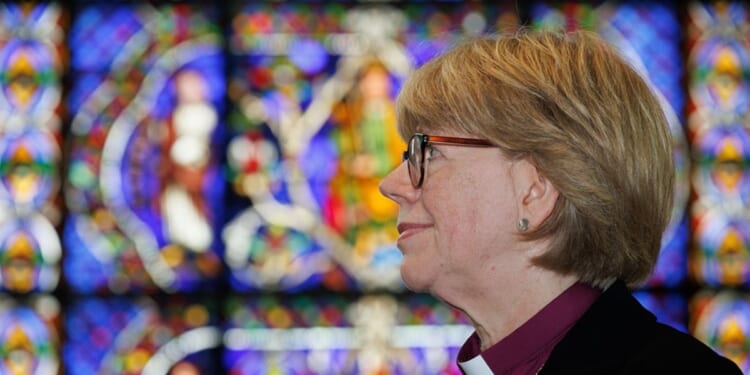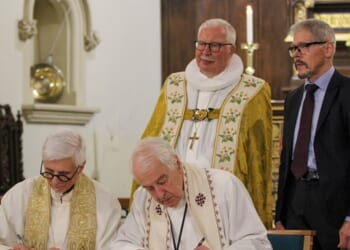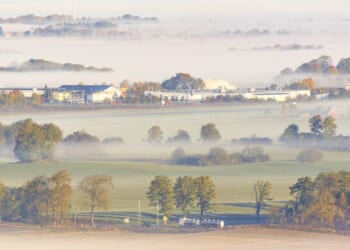THE Archbishop of Canterbury-designate has said that she believes her that experience as Chief Nursing Officer — when she worked with the World Health Organization and the UN — as well as her ministry since will serve her well as she tackles some of the challenges presented in the Church of England.
“I trust the discernment process for what is required at this this time,” the Rt Revd Sarah Mullally said. “I offered myself into it with who I am: my deep faith in Jesus Christ, and also the experience I’ve had as a Chief Nurse of leading complex organisations such as the Health Service, but also being the Bishop of London in what is a very diverse Church.
“What I offer is that, along with my desire to work with my fellow bishops, not just in the Church of England, but the Anglican Communion.”
Asked about shrinking church congregations, Bishop Mullally said that it was “really encouraging” to see that, during the past two years, attendance had grown.
“It’s not back to pre-pandemic levels, but what it does say is that . . . priests and congregations are doing what they always do: they’re engaging with their communities. They’re demonstrating the love of Jesus Christ . . . and people are coming.
“There’s a sense in which we need to carry on doing what we’re doing, and believe in that, and to have confidence that God is doing something.”
Asked about the rural Church, Bishop Mullally said that it had been “one of her greatest privileges” to serve as Bishop of Crediton in the diocese of Exeter. “I stand in awe of those communities, and the way they care, not just for the people in the churches, but in those rural villages. . .
“What I hope is that I will continue to listen to people who are in rural ministry as well as those that are in cities and urban places, because we need to listen.”
She referred to her position as chair of the Triennium Funding Working Group as an example of consultation.
“For the first time, there was a very significant listening exercise; so the outcomes of how that money is being spent were shaped by people’s comments. And, for me, that’s the really important bit. . . It is about listening.”
Does she plan to speak on political matters? “We are not members of a political party, but at the heart of our calling is to follow Jesus Christ, who sat with the marginalised and the outcast, clothed the naked, and our commission is to do the same,” she said.
“Our role is not just the individual, it is about challenging unjust structures and speaking up on behalf of people, and also giving people voices. That is what I have been doing as the Bishop of London and a Lord Spiritual, and I will continue to do that as the Archbishop of Canterbury.”
Asked whether the country was still willing to listen to an Archbishop of Canterbury, she said: “We have to gain somebody’s respect to speak, but I do think that people listen to the Archbishop of Canterbury. I am very conscious of both that privilege and that responsibility.”
As far as dealing with traditionalists, she said that, as Bishop of London, she had always upheld the Five Guiding Principles. “What I seek to do is to enable and support ministers and churches, whatever their tradition.” She had “found a way to respectfully share ministry” with opponents of women’s ministry.
Bishop Mullally said that there had been “a real shift in safeguarding” over recent years. “Over the last eight years [in the diocese], we really have seen a shift in terms of the professionals, but also the culture.
“There has been a period of significant investment, in not just people, but in training, and in the involvement of survivors. . . In London, we have been transparent, and we have also said we are a learning culture. We learn from what we’re doing, and we can never be complacent.”
Asked about her views on migration, she pointed to the Christian calling to love our neighbour: “And our neighbour isn’t always the person next door to us. Our neighbour is right across the world, and churches have always welcomed people. But also we have to recognise that, particularly in this nation at this time, people are concerned.”
Churches were at the heart of their communities and “really well-placed” to be able to have conversations that allowed people to express concerns, but also “to offer an alternative narrative”.
She spoke of the need to build trust. “You don’t just get trust on the day you come into office or pre-office: you do have to develop trust. I would hope that I would demonstrate that quickly, through the style of my leadership.”
This is what she had tried to do as Bishop of London, she said. “I’ve tried to engage people and listen to people.”
Asked whether there were any circumstances in which she would resign, as her predecessor, the Most Revd Justin Welby, had done in November, she said: “At the moment, I’m the Archbishop-designate. My focus is preparing spiritually and pastorally to take on that role next year. That’s where my focus is, offering the gifts and the experience that God has given me to the service of the Church and the world.”
















